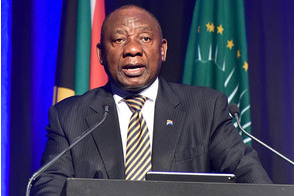Latest News
South Africa’s current account deficit widens as exports decline

News Highlight
- The current account deficit rose to 4.1 per cent of GDP (or 176 billion rand) in Q3 2016, compared to 2.9 per cent of GDP or (123 billion rand) recorded in the preceding quarter.
South Africa’s current account deficit expanded in the third quarter of 2016 as weak international demand caused the country’s exports to decline, the Reserve Bank of South Africa said in a report released on Friday.
The current account deficit rose to 4.1 per cent of GDP (or 176 billion rand) in Q3 2016, compared to 2.9 per cent of GDP or (123 billion rand) recorded in the preceding quarter.
“The surplus on the trade account of the balance of payments switched into a small deficit in the third quarter of 2016 in response to weaker international demand for domestically produced goods,” the central bank said. “In addition to a contraction in export volumes, export earnings were also affected by the strengthening in the exchange value of the rand which more than offset the benefit arising from higher international commodity prices.”
The value of merchandise exports fell by 7.2 per cent in the third quarter of 2016 as against an increase of 10.6 per cent in the second quarter. The decline was driven by decreases in the export value of mining products – especially base metals, articles of base metals, precious stones, and platinum group metals. Manufactured products also contributed to drag down total export value due to declines in exports of vehicles and transport equipment, machinery and electrical equipment, and prepared foodstuffs.
“The export of 15 locally manufactured railway coaches to a neighbouring country was insufficient to counter the decline in the total value of exported vehicles and transport equipment over the period,” the apex bank said.
As for merchandise imports, its total value contracted by 3.2 per cent in the third quarter on account of weak domestic demand compared to a growth of 1.3 per cent in the second quarter.
“A decrease in the value of manufactured imports was only partly neutralised by increases in the value of mining and agricultural imports over the period,” the central bank said. “In the category for manufactured imports, pronounced decreases were noted in the value of imported machinery and electrical equipment, vehicles and transport equipment, chemical products as well as textiles and textile articles.”
South Africa’s flagging economy has led to heightened fears that the country’s credit rating might be downgraded by ratings agencies to junk status. The prolonged political uncertainty – caused mainly by corruption scandals in President Jacob Zuma’s government – has further dampened investor sentiment in Africa’s most industrialized country.
Related News
Latest Blogs
- Assessing the National Policy on Marine and Blue Economy
- When the intent of taxation reset diverges from its execution
- Towards healthcare system that protects patients and is fair to practitioners
- Outlook on 2026 global remittances and Nigeria
- Putting food at the centre of Nigeria’s health reform
Most Popular News
- Artificial intelligence can help to reduce youth unemployment in Africa – ...
- Profile and reflection on Africa's women leadership ahead of IWD 2026
- NDIC pledges support towards financial system stability
- Grene Capital spins out of Actis as independent real asset fund manager
- Afreximbank ends its credit rating relationship with Fitch
- Cairo events focus on Africa’s asset integrity and cybersecurity









